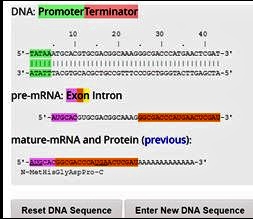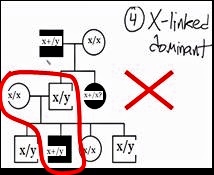Course: Introduction to Biology – The Secret of Life
Length: 9 weeks (self-paced)
School/platform: MIT/edX
Instructors: Eric Lander
Quote:Explore the secret of life through the basics of biochemistry, genetics, molecular biology, recombinant DNA, genomics and rational medicine.
Short version: Fantastic course. Excellent material, engaging and varied presentation style, homework and exams that test conceptual understanding and synthesis, humor. Not much forum activity, however. Not an easy course, but do-able with effort. [Addendum: I’ve re-taken this course a couple of times since writing this; it’s still one of my favorite moocs, and I still highly recommend it, especially as a first biology course]
 It’s something of an odd administrative setup. The course is intended as preparation for a Competency Exam, available only to those who sign up for the Verified track (which costs money). I’m not sure of the details, like the exact fees or the conditions of the Exam, or the significance of it: is it recognized by MIT? beyond moocdom? In any case, that was irrelevant to my purpose, which was to understand biology.
It’s something of an odd administrative setup. The course is intended as preparation for a Competency Exam, available only to those who sign up for the Verified track (which costs money). I’m not sure of the details, like the exact fees or the conditions of the Exam, or the significance of it: is it recognized by MIT? beyond moocdom? In any case, that was irrelevant to my purpose, which was to understand biology.
In that, it was a great success: Dr. Lander, in addition to being one of the leading geneticists in the world, and by the way one of the founders of the Innocence Project, is an outstanding teacher. All of his lectures take place in an in-session MIT classroom, and he has a great time telling stories about yeast juice, Linus Pauling in bed with a head cold inventing protein folding (but totally missing it on DNA structure), and asking a lot of “how do you think you’d do that?” questions once we started looking at gene cloning procedures. There are several “fun” videos thrown in as well, including MIT’s own version of “Gangnam Style” (remember that?) in which Dr. Lander appears (as well as Noam Chomsky, for pete’s sake) and a much older Stanford version of protein synthesis on the football field.
 In addition to the lectures, a variety of Deep Dives and Lab videos offered by a variety of MIT students and staff explained important concepts and procedures in great detail. A problem set, intended as formative assessment (meaning the purpose is more about learning to apply concepts, not judging progress) finished off each week, with an additional Exam (generally the same types of questions as on the Problem Sets) every three or four weeks. Right/wrong answers are indicated, and you can keep track of your scores to see how you’re doing, but the only “grade” is for the Competency Exam, if that option is selected, at the conclusion of the course.
In addition to the lectures, a variety of Deep Dives and Lab videos offered by a variety of MIT students and staff explained important concepts and procedures in great detail. A problem set, intended as formative assessment (meaning the purpose is more about learning to apply concepts, not judging progress) finished off each week, with an additional Exam (generally the same types of questions as on the Problem Sets) every three or four weeks. Right/wrong answers are indicated, and you can keep track of your scores to see how you’re doing, but the only “grade” is for the Competency Exam, if that option is selected, at the conclusion of the course.
The content of the course revolves around a “coat of arms” joining biochemistry, genetics, and proteins, with genomics taking the long view. The material is something of a narrative roughly following the chronological history of biology. As a result, there’s always a sense of “you won’t believe what happened next.”
 Weeks 1 through 4 started with basic biochemistry (there’s very little cell biology, however, which was a bit disappointing), then moved on to the discovery of enzymes, proteins, and amino acids, basic genetics and heredity. I did this section about a year ago but it was worth doing it again. Very little prior knowledge is assumed; some chemistry is probably helpful, but my chem is very low-level and it wasn’t a problem for me. The problem sets were terrific: maneuverable protein images, protein design apps, questions on biochemical pathways that really tested my ability to read and understand the chart.
Weeks 1 through 4 started with basic biochemistry (there’s very little cell biology, however, which was a bit disappointing), then moved on to the discovery of enzymes, proteins, and amino acids, basic genetics and heredity. I did this section about a year ago but it was worth doing it again. Very little prior knowledge is assumed; some chemistry is probably helpful, but my chem is very low-level and it wasn’t a problem for me. The problem sets were terrific: maneuverable protein images, protein design apps, questions on biochemical pathways that really tested my ability to read and understand the chart.
Weeks 5, 6, and 7 moved into a detailed look at DNA: replication, transcription, translation, mutations, and the process of cloning DNA (which is nothing like cloning sheep or people). I loved this unit. The exercises were particularly helpful: “edit a gene” software, “make a plasmid” questions, very practically-oriented problems requiring application of concepts, with virtually no information-retrieval questions.
 I bailed out in week 8 because I had other courses starting, and since I wasn’t going to take the Competency Exam, it didn’t matter. That’s something of a cop-out; mostly I’m just not that interested in genomic research, which is kind of sad since 1) it’s really what biology is about these days, and 2) it’s Dr. Lander’s specialty. But I got more than enough out of the course to have made it very worthwhile, and I can always go back and pick up the final portion when I’ve got less on my plate.
I bailed out in week 8 because I had other courses starting, and since I wasn’t going to take the Competency Exam, it didn’t matter. That’s something of a cop-out; mostly I’m just not that interested in genomic research, which is kind of sad since 1) it’s really what biology is about these days, and 2) it’s Dr. Lander’s specialty. But I got more than enough out of the course to have made it very worthwhile, and I can always go back and pick up the final portion when I’ve got less on my plate.
On the down side, there was very little interaction or support on the forums. Early on, some technical issues were addressed, but questions about content often went unanswered. I’m not sure if that’s because they’re  focusing on the verified track (which, in their Philosophy moocs at least, MIT has segregated from audit track posts – two-tier education, coming to a mooc near you) or if it was just a quiet bunch.
focusing on the verified track (which, in their Philosophy moocs at least, MIT has segregated from audit track posts – two-tier education, coming to a mooc near you) or if it was just a quiet bunch.
I can’t speak to the Competency Exam track, but if your goal is to better understand the areas of biology mentioned above, this is a great course for it (you’ll need to go elsewhere for cell biology; Harvard’s mitochondria course might be a good place to start) [Addendum: MIT has since added a series of four cell biology moocs]. I’d say in terms of learning, it’s one of the best courses I’ve taken. It also happens to be fun. What more could you ask for?

Pingback: The MOOC’s a harsh mistress: Fall 2016 | A Just Recompense
Pingback: Molecular Bio MOOC, part I: DNA copied while you wait | A Just Recompense
Pingback: Genetics MOOC: The Fundamentals | A Just Recompense